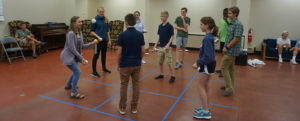| “The Margin Series” focuses on the reality that everyone has limits regarding time, emotional energy, physical energy, and money, among other areas. These monthly sub-topics assert that we need margin for optimal function as well as for availability to love and serve others. |
“This cup, this cup
I wanna drink it up
To be right here in the middle of it
Right here, right here
This challenging reality
Is better than fear or fantasy”
—The chorus of “This Cup” from the 2015 album Floodplain by Singer-Songwriter Sara Groves
“Concerning our children, one of the greatest gifts we can give them is that of biblical contentment…today’s youth peer cultures can be difficult to endure. It often seems no youth can measure up unless they are attractive, intelligent, athletic, and rich. Make the home a countercultural place of safety and contentment.”
—Richard Swenson, Contentment: The Secret to a Lasting Calm (Colorado Springs: NavPress, 2013), p. 199.
As I first read that Richard Swenson quote above on 8/7/15 (I habitually record the dates of my on-and-off reading discipline), I wrote in the margin of p. 199, “And JUGHEADS.” Inasmuch as I’ve always considered this company as a home away from home (a sentiment shared by many Jugheads over the years), I want JUGHEADS to be “a countercultural place of safety and contentment.”
But that is a tall order, is it not? It’s also paradoxical. In Chapter 1 of Contentment, a profound follow-up to his signature work on Margin, Dr. Swenson clarifies that “contentment is not complacency” and “contentment is not about mediocrity,” but rather, “contentment means that we work hard on this broken world but always with a yielding to God in our hearts, a glad submission to His will…and pursuing God’s daily agenda even if it means walking directly into the storm” (Contentment, Colorado Springs: NavPress, 2013, pp. 21-22). Like the costly peace covered in this column in December 2019, contentment (most) often isn’t easily attained. But it is a treasure for those who seek to find it.
There are so many areas in life for which contentment is the cure, and certain areas are emphasized at various stages in life. Considering with broad-brush strokes the major generations represented by the families of JUGHEADS, it seems to me that the average Jughead needs to learn contentment with: each Club level any given year; elusive skills that take months or years to master (if ever); learning to deal with failure over social skills (e.g., rifts with friends, or having no friends at all at Club); rejection (e.g., not making it past Juggle Jam specialty act auditions or simply not being chosen as a passing partner or co-emcee); and “juggling” many schedule priorities among family, church, school, and other extra-curriculars while not wanting to let anyone down, including a Jughead’s Club-specific Staff & SLT.
For parents and others in the wide swath commonly known as “middle age,” contentment is often tested in terms of happiness in marriage (or singleness), satisfaction in career, and confidence/security in the future (especially finances). And at the uppermost end of life, grandparents and others in their golden years are certainly not exempt from the quest to be content, perhaps most notably in the areas of increasing health struggles, fixed income in retirement (while battling the inflation monster), loneliness (especially if estranged from adult children, extended family, and long-lost friends), and frustration with our society’s changing norms (for better or for worse).
I know I promised in September that I wouldn’t exploit this series as “a self-indulgent exercise of personal reflection,” but if you’ll indulge me for one paragraph ;-), I’ll use my life as an example of striving for contentment. Last November, I decided to resume my once-held discipline of dedicating at least part of every Tuesday to extended time to fast, journal and pray as a way to earnestly seek God’s will for my life. Over New Year’s, my 23-year-old nephew, David Arneberg, challenged me to go on an extended fasting and prayer retreat. I did just that by renting a family’s cabin from Jan. 20-22, focusing many hours on the areas of Career, Church, and Home, all with contentment as the goal, fueled by much prayer for wisdom and courage. Even though I didn’t come home with all my prayers clearly answered, I developed several new tools for daily contentment, such as deliberately and daily listening to edifying music rather than only my barrage of podcasts and news shows; limiting how many days a week that I even turn on the TV; and 1-Year, 5-Year, and 10-Year brainstorms for my life. Wisdom calls for when to strive and when to rest. But I’m actively seeking, and listening.
On the way to my mid-January retreat, I listened intently to Sara Groves’ Floodplain album. “This Cup,” the first track, has been an anthem of mine in recent months, and that helped to set my mind on contentment even as I prepared my heart for much soul-searching and God-seeking. Yes, we all have “challenging realities,” but if we learn to embrace our circumstances and seek for God’s will as our character is strengthened, we may find that “this cup” is far better than any “fear or fantasy.”
I am cognizant of the fact that these long editorials often seem to have little to do with youth juggling. But they do have to do with wholistic living. I pray that any readers will search for the “rare jewel” of contentment (a phrase coined by Jeremiah Burroughs in his book in the 1600’s) as one antidote to lives that are otherwise marked by disappointment, heartbreak, fear, or fantasy.
In “Simplicity” last month, I quoted 1 Tim. 6:6-8; it’s a key teaching on contentment. Here are two other precious passages:
“Keep your life free from love of money, and be content with what you have, for he has said, ‘I will never leave you nor forsake you’ ” (Hebrews 13:5, ESV, citing Deuteronomy 31:6).
“I have learned in whatever situation I am to be content. I know how to be brought low, and I know how to abound. In any and every circumstance, I have learned the secret of facing plenty and hunger, abundance and need. I can do all things through him who strengthens me” (Philippians 4:11-13, ESV).
Both passages focus squarely on material needs: money and food. They are also applicable to the intangible (and I would argue, even more prevalent for most of us in 2020) areas needing the “great gain” of godliness with contentment: relationships, career, talents, social position, fame, power. Contentment is the key to not only a life of margin, but a life (and a Jughead career) of overcoming, of gratitude, of simplicity, and of peace.

